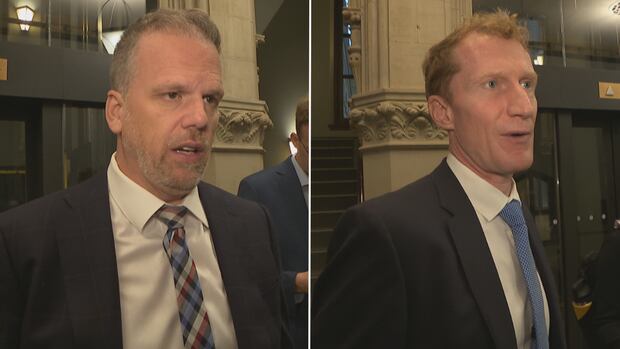Bloc Québécois Leader Yves-François Blanchet laid out a list of demands Wednesday he said the government must fulfil by the end of October if it wants to avoid the risk of an early election.
Speaking to reporters on Parliament Hill, Blanchet said the Bloc wants the government to push through a bill, C-319, that would hike Old Age Security (OAS) payouts by 10 per cent for seniors between the ages of 65 and 74. The government topped up OAS payments for seniors aged 75 and older in 2022.
Blanchet also said he wants the government to agree to pass a Bloc private member’s bill, C-282, that exempts the supply-managed farm sectors — dairy, poultry and eggs — from any future trade negotiations.
He said those demands must be met by October 29. If they’re not, he said, the Bloc will start negotiations with the Conservatives and the NDP on toppling Prime Minister Justin Trudeau’s government.
Yves-François Blanchet, leader of the Bloc Québécois, has laid out a list of demands for the Liberal government. Blanchet said the government must fulfill them by October 29 if it wants to avoid the risk of an early election.
If the Liberals come through on those two priorities, Blanchet said, the Bloc won’t vote against the government before Christmas. That would all but guarantee the government’s survival into the new year.
“What we are proposing is good for retired persons in Quebec but also in Canada. It’s good for milk, eggs and poultry producers in Quebec but also in Canada. That’s good for everybody,” Blanchet said.
Asked if the government has indicated it’s open to his demands, he said he’s not sure what its response will be yet.
“We have spoken to nobody about that. We have had no discussions,” he said.
The Liberal government wouldn’t necessarily fall if the Bloc pulls its support. Trudeau could convince the NDP to back him up again.
The Conservatives are eager to go to an election as soon as possible and have threatened to table more non-confidence motions in the coming weeks to trigger a vote.
The Liberals hold 153 of the 338 seats in Parliament.
To get to a majority of 169 MPs without Conservative support, the Liberals need either the NDP (25 MPs) or the Bloc (33 MPs) to stand with them.
The Conservatives (119 MPs) and the Bloc voting together wouldn’t be enough to bring down the government — the NDP also would have to come on side.
Generational fairness
It’s not clear how the government could meet the Bloc’s demands, given some parliamentary realities.
C-319, the OAS top-up bill, is up for debate later today in the Commons. It also would have to clear the Senate before it could become law.
Because it directs the government to spend money, it would need a “royal recommendation” from the government before it could be enacted. In the normal course of business, all of that would take months to accomplish.
The Parliamentary Budget Officer (PBO) has said the Bloc’s 10 per cent boost would have a net cost of $16.1 billion over five years — a pricey commitment as the federal government is trying to find money to expand new social programs and build up Canada’s military to meet NATO spending targets.
The Conservatives want to give the NDP and the Bloc as many opportunities as possible to vote with the government, says Chris Hall, a managing principal at Navigator and a former CBC News national affairs editor.
The top-up also raises questions about generational fairness — something the government has said it cares about.
Elderly benefits, including OAS and the Guaranteed Income Supplement (GIS) for low-income seniors, are expected to cost the federal treasury roughly $80 billion this fiscal year — a budget line item much larger than other major programs, such as Employment Insurance (EI), the Canada Child Benefit and federal health-care transfers.
The Canada Pension Plan (CPP) is funded by employee and employer contributions, not through general tax revenues like the other two federal retirement benefits.
As for C-282 — which would tie the hands of future trade negotiators — the legislation is before a Senate committee.
The government has little, if any, control over how long the Red Chamber takes to debate, amend or pass legislation through a committee.
That Senate committee is chaired by Ontario Sen. Peter Boehm, a former G7 sherpa who has previously expressed reservations about the legislation.
Some farmers have lobbied hard for the bill, while trade experts have panned it as problematic ahead of an expected renegotiation of the Canada-United States-Mexico Agreement (CUSMA), which could happen as early as 2026.
Health Minister Mark Holland and Immigration Minister Marc Miller react to Bloc Québécois Leader Yves-François Blanchet’s threat to push for an early election if the federal government does not meet his party’s demands by Oct. 29.
Health Minister Mark Holland bristled at the Bloc issuing what he called “ultimatums.”
“It’s always reasonable to suggest things. Brandishing ultimatums sounds to me that it’s all about politics rather than the substance. I’d say, ‘Let’s have policy conversations,'” he said.
Holland said that while the Bloc’s OAS proposal will be “considered,” the government is already rolling out dental care and pharmacare, programs that “obviously have huge implications for seniors.”
Government House leader Karina Gould was non-committal about the Bloc’s pension demand.
“We’ve done a lot for seniors as a government but, you know, that’s something that is important for us to look at,” she said.


